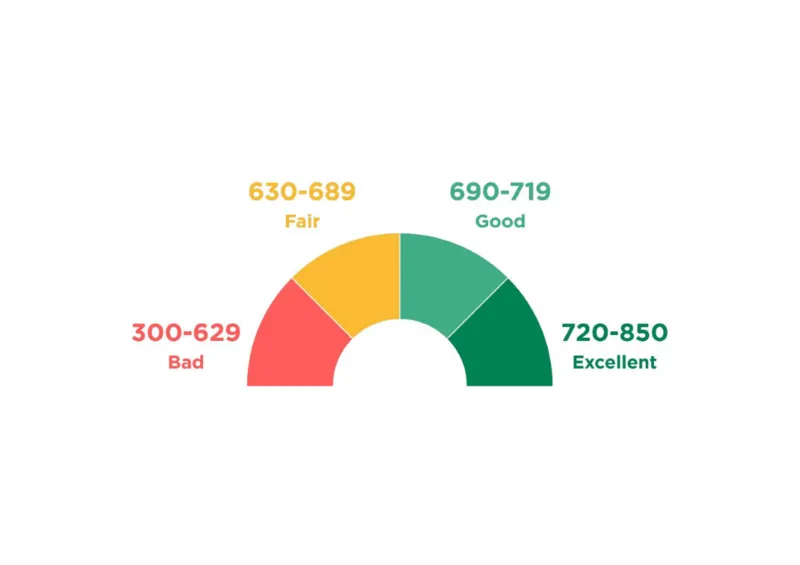Understanding Credit Score and Credit Report
In managing your financial health, understanding your credit score and credit report is crucial. These two financial tools play significant roles but serve different purposes. A credit score is a numerical representation of your creditworthiness, while a credit report is a detailed record of your financial behavior. In this article, we will define these terms, explore their differences, and discuss how they impact your financial standing.
What is a Credit Score?
A credit score is a three-digit number that lenders use to evaluate the risk of extending credit to you. This score ranges from 300 to 850, with higher scores indicating better creditworthiness. The score is calculated based on factors like payment history, amounts owed, credit history length, credit types used, and recent credit inquiries. Financial institutions such as banks, credit card companies, and mortgage lenders use this score to decide on loan approvals and interest rates.

Common credit scoring models like FICO and VantageScore each have unique methods for calculating credit scores. A high score can secure lower interest rates, while a low score may result in higher rates or denied credit. Understanding your credit score is essential for maintaining financial health and enhancing your chances of obtaining credit when needed.
- Regular Updates: Your credit score is updated regularly based on changes in your credit activity, such as payments made or new credit inquiries.
- Influence on Loan Approval: Lenders may use your credit score as the primary deciding factor in whether you qualify for a loan or credit.
What is a Credit Report?
A credit report is a comprehensive documentation of your past credit behavior. Unlike a credit score, which is a single number, a credit report provides detailed information about your credit accounts, payment history, and personal details such as your name, address, and Social Security number. It may also include public records like court judgments or bankruptcy filings.
The three major credit bureaus—Equifax, Experian, and TransUnion—maintain credit reports. They update these reports regularly to reflect changes in your credit activities, such as new accounts, payments, or settled debts. Reviewing your report regularly helps you monitor your financial status and catch errors or potential fraud early.
- Personal Details: In addition to financial data, your credit report includes personal information such as your full name and address.
- Fraud Detection: Regular checks of your credit report can help spot fraudulent activities or inaccuracies before they cause serious harm.
Key Differences Between Credit Score and Credit Report
Although credit scores and credit reports are related to your financial wellness, they differ significantly in content and purpose. A credit score is a numeric evaluation of your ability to repay debt, while a credit report provides detailed information on all your financial transactions involving debt. Your payment history and balances contribute to generating your final credit score, which is part of the comprehensive document known as a credit report.
Your credit score is often updated more frequently, particularly when significant changes occur, such as missed payments or the opening of a new credit account. In contrast, your credit report generally updates monthly and includes more detailed information about your financial management. While a credit score offers a snapshot of your financial status, lenders rely on credit reports for a detailed view.
- Frequency of Updates: Your credit score is updated more often than your credit report, typically when major financial events occur.
- Detailed Information: Credit reports contain detailed history, including types of accounts, balances, and payment patterns.
How Credit Scores Impact Your Financial Health
Your credit score is a critical component of your financial health. A high score can lead to better loan terms, lower interest rates, and increased credit limits, providing financial flexibility. Conversely, a low credit score may result in loan denials or higher interest rates, significantly increasing borrowing costs.
Credit agencies often use your credit score to assess your likelihood of repaying a loan. This score reflects your past credit behavior, serving as a predictor of future financial responsibility. Regularly monitoring your credit score is vital when considering new credit applications and understanding how borrowing affects long-term financial stability.
- Loan Terms: A high credit score can qualify you for better interest rates, potentially saving you thousands over time.
- Credit Monitoring: Regular credit score monitoring can help you avoid surprises and improve financial planning.
How Credit Reports Affect Your Financial Decisions
While your credit score provides a quick assessment of your financial status, your credit report offers an in-depth view for lenders and financial institutions. Financial actions, such as mortgage approvals, car loans, or new credit cards, often rely on details from your credit report. Lenders assess your ability to manage credit by examining payment history, credit utilization, and account longevity.

Your credit report also plays a crucial role in determining interest rates. Lenders use this information to evaluate the risk of lending to you, and a clean credit history with timely payments can result in more favorable terms. Maintaining an accurate credit report is essential, as errors can reduce your chances of obtaining financial services or the best rates.
- Impact on Loan Approval: A positive credit report can improve your chances of getting approved for loans and credit.
- Interest Rates: A clean credit report can lead to more favorable terms on loans and lower interest rates.
How to Improve Your Credit Score and Report
Improving your credit score and report requires dedication and patience, but the payoff is worthwhile. To enhance your credit score, focus on paying bills on time, reducing credit card debt, and limiting new credit inquiries. Avoiding late payments and maintaining low credit card utilization can significantly impact your score.
For your credit report, regularly check for errors and dispute inaccuracies with credit agencies. Clearing old debts, reducing overall debt, and maintaining a diverse credit mix will enhance your credit report and, in turn, improve your score.
- Credit Disputes: Disputing incorrect information on your credit report can prevent future financial damage.
- Debt Reduction: Paying down existing debts and maintaining a low balance on credit cards can positively impact both your score and report.
Maintaining a Healthy Credit Score and Report
Maintaining a good credit score and a clean credit report is crucial for your financial well-being. Not only does it affect your ability to obtain loans, but it also impacts many aspects of your personal financial life. Whether you’re applying for a car loan, home mortgage, or a new credit card, a strong credit profile can open more opportunities and reduce financial costs.
Your credit score and report are significant indicators of your financial behavior, so it’s essential to understand and manage them effectively for better financial outcomes. Regular monitoring, efficient dispute handling, and consistent credit habits can help you maintain a good reputation and enjoy lower borrowing costs.
- Long-Term Benefits: A solid credit history benefits your financial future, including lower insurance premiums and improved job prospects.
- Credit Education: Educating yourself about credit scoring models and report details can empower you to make informed decisions.
Conclusion
In conclusion, while your credit score and report are closely linked, they serve different purposes. Understanding both can help you better manage your financial future. Regularly reviewing your credit report, monitoring changes in your credit score, and taking steps to improve them will set you on the path to stronger financial health and greater financial opportunities.











